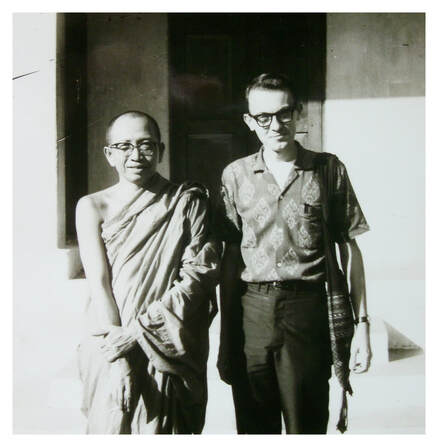|
REMINISENCE ABOUT REENTRY
The idea I had in going to Thailand in 1965 when the invitation came, was to gain experience that would help me understand more about what the church was doing in the world. My plan was to gain valuable experiences of the church at work. By that time I had been the religion editor for the Jacksonville Journal Courier, chaplain’s assistant in locked wards in the Jacksonville State Hospital, student pastor in the Arenzville Presbyterian Church, assistant to the director of the Department of Camps of the Presbytery of Chicago and more. Overseas mission would fill in a gap because, “How could a pastor be completely ready to serve without knowing what the church is doing in its foreign missions?” (It was a naïve question. Most pastors cared very little about foreign missions. That was going to impact the United Presbyterian Church (USA) heavily in less than a decade.) Succinctly, my plan was to immerse myself in Thailand for what the UPC called a “short term” and then return to the USA to get on with being a Presbyterian minister – after an additional year and a half at St. Andrews in Scotland to get a PhD in ‘applied theology,” for which I was accepted. I had not counted on Thailand being life-changing. The ways that happened included: discovering an affinity for Thailand and its people (including, surprisingly, the language), the proximity of the Vietnam War to Thailand and the imminent threat we felt from Communist totalitarianism, the realization that NOW was the time to get married, and the change of regulations in UK higher education that suddenly raised the cost of the PhD out of reach. The second half of my 4 years as a teacher in the Thailand Theological Seminary was characterized by challenges and accomplishment. As a missionary I developed a multi-media center (with Gerry Dyck), served as the first co-pastor of the Chiangmai Community Church (with John Butt), wrote a textbook entitled Worship as Celebration of Life (which was translated into Thai by Francis Seely and his Thai Textbook Project team), and I was the first American teacher in the brand new school for Buddhist priests and novices in Wat Prasingh. Then it came to an end. Whoops! New plan. Needing something to do while finding a job I signed up for a Master of Sacred Theology (STM) back at McCormick Theological Seminary in Chicago. The place had changed unbelievably in the 4 years I had been away. It was “the Age of Aquarius” post-Woodstock. We arrived just after the Puerto Rican gang, the Junior Latin Counts, had given up their “take over” of the seminary as their headquarters to try to stop the gentrification of Lincoln Park neighborhood. Chicago was radicalized after the riots at the time of the 1968 Democratic National Convention in Chicago. And the turning point of the anti-war movement was a dominant part of everything. I was more disoriented than I had ever been. I have rarely felt as much a misfit as I did that year back in Chicago. The only things that made it bearable were related to Thailand, not to Chicago – up to then “my town, town that I loved.” During that year I provided editorial help to Kamol Aryapratheep as she worked toward becoming the first Thai theologian with a Doctor of Theology degree. I collected creative projects from my years in Thailand, including liturgies, stories, and text for a cantata to be my STM project. I learned how to work with a film lab to edit a Thai version of “The Loving Father” (based on the Prodigal Son parable), which I had scripted and directed, shot on 16mm film by Leonard Crane at National Council of Churches expense. I had my first academic article published in the South East Asia Journal of Theology. One thing was clear by May 1970: my place in the church was as a pastor. It was not possible to return to Thailand because the UPC budget for overseas fraternal workers (missionaries) was running in the red. I needed an entry-position in the USA to get started. My decade of “gaining experience” was over. It was time to settle down. But nothing I had done was convincing enough to pastoral search committees that I could handle the job as a pastor. All my experiences, ironically, had made me “overqualified,” said key committee members in Decatur IL, Basking Ridge NJ, Lancaster PA, State College PA, and a half dozen other churches where I was invited to be interviewed. Then, in the first week of May, 1970, just days before graduation and eviction from seminary housing, Jim Bigley and the committee of the United Presbyterian Church of Maple Heights, Ohio, agreed to take a chance on me. That was the answer we needed … and not a moment too soon.
0 Comments
Leave a Reply. |
AuthorRev. Dr. Kenneth Dobson posts his weekly reflections on this blog. Archives
March 2024
Categories |
| Ken Dobson's Queer Ruminations from Thailand |
|

 RSS Feed
RSS Feed
